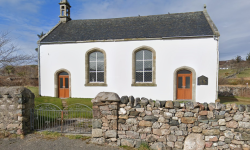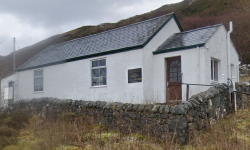George Campbell, Glasgow
George Campbell’s father, also George Campbell, was Gaelic school teacher in the parish of Eddrachillis from 1821. Thus the son would likely have been born and raised in the parish.
From Free Presbyterian Magazine Feb 1905 Vol 9(10): p372-375:
The late George Campbell
Glasgow.
It is with much regret we record this month the death of Mr George Campbell, formerly postmaster at Kilmore, Oban, which took place suddenly at 35 Scotia Street, Glasgow, on the 2nd January. Mr. Campbell, who had reached the advanced age of 82 years or upwards, was the youngest and last-surviving of three worthy brothers, who were well known in religious circles in the Highlands in their day. They were sons of George Campbell, a godly Gaelic schoolmaster, who died at Scourie, Sutherlandshire, shortly after the Disruption of 1843.
The oldest was the late Mr. Walter Campbell, missionary, North Uist, and the second was the late Mr. William Campbell, missionary, Wick. The third is the subject of this notice. For the last two years and a-half Mr. Campbell was closely identified with the John Knox’s congregation in Glasgow, and often conducted its services, to the edification of the hearers. Office-bearers and people became much attached to him, and his sudden removal is felt as a painful breach in their midst. Though a man of such advanced years, he retained his vigour almost to the very last, and was out visiting friends two days before his decease. Mr. Campbell was a man of a lively, acute intellect, possessing more than ordinary understanding of God’s Word and experience of its power, and, though marked by some peculiarity of manner, was a truly lovable and estimable Christian man. In some respects an outstanding personality, a brief account of him, we believe, will be interesting to our readers.
It appears that his spiritual concern did not begin until he had reached the years of manhood. Before then, to quote his own words, he was “ very light and foolish, and very ignorant even of the letter of the Bible,” though brought up under the instruction of a pious and intelligent father. His mind was wholly taken up with the world and its pleasures. At this time he went to hear that highly-honoured servant of Christ, the late Rev. Duncan Campbell, Free Church minister of Kiltearn,1 whose text on the occasion was, “All that the Father giveth me shall come to me, and him that cometh to me I will in no wise cast out.” (John 6:37).
The hearer’s impressions were of a melting nature—and these under the first part of the text—but they soon faded away and left him very much as he was before. He again heard Mr. Campbell, Kiltearn, at Alness, and on this occasion the impression was of a deep and lasting nature. The preacher in the course of his sermon delivered those solemn words of warning first spoken by Christ, “ Woe unto thee, Chorazin! woe unto thee, Bethsaida! for if the mighty works which were done in you had been done in Tyre and Sidon, they would have repented long ago in sackcloth and ashes. But I say unto you., It shall be more tolerable for Tyre and Sidon than for you.” The words struck “like balls of fire” upon the young man, and he almost fell from the seat where he was sitting. It is worth noticing for the benefit of preachers and others that no other part of the discourse, though containing excellent matter, had any appreciable effect. It was just the delivery with power of a portion of God’s Word that went home to the heart of our friend, and was the beginning of a good work in him. After he came out of the Church, he began to reflect upon his experience, and thought that surely now he was converted, and he even contemplated the pleasure he would derive from the company of God’s people whom he expected to meet at his father’s house.
But a disappointment awaited him; he found that he could not enter into or relish their conversation, nor enjoy their society. He was “shut up under the law,” and the gospel, had not yet come to him in the power of the Holy Ghost; though convinced of sin and the curse, he did not understand the way of salvation by Christ, nor had experienced the light and liberty of the children of God. His experiences of law and gospel were very distinct and separate from each other. Under the work of legal conviction he continued for a considerable time, kept at prayer and religious duties, making mention of the name of Christ, and yet having no understanding of Him, feeling himself getting worse and worse and beginning to think he was an undone outcast for ever It was while under such painful reflections as these that he went with his brother Walter to a communion “in Dr. Mackay’s Church, Inverness, at which the late Dr. Kennedy, Dingwall, was assisting. He heard Dr. Kennedy each day until Monday without any relief, but on Monday towards the close of the discourse his soul got a clear and marked deliverance. The text, if we are not mistaken, was Ps. xlv. 10, 11, beginning, “Hearken, O daughter, and consider and incline thine ear,” and in his application Dr. Kennedy spoke with special power. In endeavouring to encourage and win sin-convicted souls, he made the striking remark (one that we have also observed in Whitefield’s sermons) that Christ always accepts (or gets) “the devil’s leavings,” and shortly thereafter quoted the apostle’s words, “ Ye have not received the spirit of bondage again to fear, but ye have received the Spirit of adoption whereby we cry Abba Father.” Here our friend felt the chains of bondage and despair fall off, and was led into hope and liberty. Others in the audience seemed also deeply affected at this stage of the discourse. When he came out of the service, he felt as if he were in a new world. Everything had assumed a changed appearance. He saw a new beauty and attraction in the people of God; he beheld them “so near,” when before everybody and everything appeared so dark and distant. The Scriptures were opened up to him in a way never experienced before; he understood more of them by that short experience of the Spirit’s teaching than he did in all his previous lifetime of natural instruction. Even the earth and the skies had a new brightness for him. As may be expected, he could not contain himself, but expressed his delight at the change to his brother Walter, who prudently dropped a word of caution, “See that it will continue.” And there is no doubt but it did continue in George Campbell’s case, whatever ups and downs he may have had in his life’s history.
Mr. Campbell, as has already been remarked, had a very acute intellect, which was much exercised on God’s Word. His delight was in the law of the Lord, and in that law he meditated day and night. His conversation on particular texts and points of doctrine was very interesting and instructive. A little impulsive in his way, he was also at the same time remarkably sincere and single minded, genial and child-like in disposition—a man, indeed, who had the true “spirit of adoption.” It was noticeable that the real breath of the Spirit often accompanied his remarks in ordinary conversation, and that to a degree seldom met with. He had also interesting reminiscences to relate of worthies he had seen and met in days of old, and especially of eminent ministers of the gospel whom he had heard.
There were three of these whom he specially delighted to converse about—Dr. Kennedy, Rev, Archibald Cook, and the Rev. John Macrae (Macrath Mor). Of Dr. Kennedy’s elevated doctrine and intimacy with the Lord in prayer, of Mr. Cook’s holy character and original handling of divine truth and Christian experience, and of Mr. Macrae’s rich, powerful preaching of the Gospel in a way suited to the varied wants and cases of the poor and needy in Zion, he would often speak in the most lively and edifying manner. He was greatly interested in these Gaelic sermons of Mr. Cook’s which are appearing in the Magazine, and often described them with an intense sense of relish as “ well-cooked meat.”
Mr. Campbell was one who took a deep interest in the public cause of Christ, and in consequence of the passing of the well-known Declaratory Act in the Free Church, he left that communion in 1893 and associated with those who formed the Free Presbyterian Church.
Though a good deal impressed with the recent decision of the House of Lords in favour of the Free Churchmen who remained along with the majority until the union of 1900, he ever held that the right time to separate was after the passing of the Act referred to. Indeed, he sometimes said “ We should have come out sooner-when the Assembly placed Dr. Dods in the chair, a man who denied the infallibility of the Word of God.” This leads us to notice an outstanding characteristic of Mr. Campbell’s in recent years, namely, a most fervent opposition to the errors of the Higher Critics in regard to the Holy Scriptures.
In regard to this evil sign of the times he was all on fire ; it was with him day and night; and he could hardly meet a friend on the street without denouncing, in the strongest terms, the deadly heresies and blasphemies against the holy Word of God by Professors in Presbyterian Colleges. The United Free Church in its maintenance of such teachers was the object, and that justly, of his severest condemnation. “ That Church,” he said, “ supporting these Professors is the greatest curse that ever rose in Scotland.” He often quoted in this connection the words of the inspired Apostle (Rev. xxii. 19), “ And if any man shall take away from the words of the book of this prophecy, God shall take away his part out of the book of life, and out of the holy city, and from the things which are written in this book.”
Mr. Campbell was ‘a man of prayer. His prayers in public were for the most part accompanied with the unction of the Spirit, and were pointed, fresh, and stimulating. “ The presence of the Lord ” in religious exercises was what he most desired for himself and others, and the grand theme which he loved to dwell upon, and which often completely broke him down, was the glorious person of Christ as “God manifest in the flesh, justified in the Spirit.” Mr. Campbell died as he lived. On his knees, in the usual attitude of prayer, “ he was not, for God took him.” To those friends, with whom he often walked in sweet counsel and fellowship during the closing years of his life, his memory will always be fragrant and precious.
“Help, Lord, because the godly man
Doth daily fade away,
And from among the sons of men
The faithful do decay.”—Ps. 12:1.
J.S.S.
1The Rev. D. Campbell, Kiltearn, died on 21st October, 1873, aged 77 years.—E.

